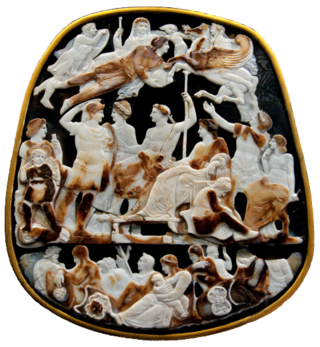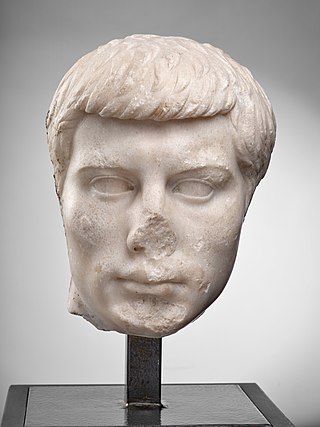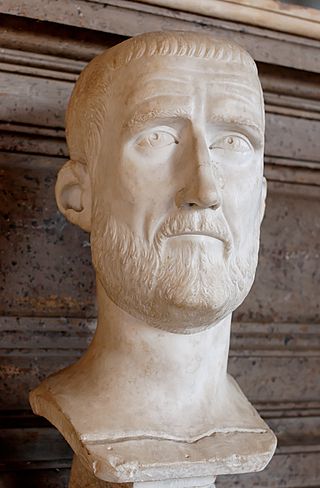
Tiberius Claudius Caesar Augustus Germanicus was the fourth Roman emperor, ruling from AD 41 to 54. A member of the Julio-Claudian dynasty, Claudius was born to Drusus and Antonia Minor at Lugdunum in Roman Gaul, where his father was stationed as a military legate. He was the first Roman emperor to be born outside Italy. Nonetheless, Claudius was an Italian of Sabine origins.

Gaius Caesar Augustus Germanicus, better known by his nickname Caligula, was the third Roman emperor, ruling from AD 37 until his assassination in AD 41. He was the son of the Roman general Germanicus and Agrippina the Elder, Augustus' granddaughter. Caligula was born into the first ruling family of the Roman Empire, conventionally known as the Julio-Claudian dynasty.

Galba was the sixth Roman emperor, ruling from AD 68 to 69. After his adoption by his stepmother, and before becoming emperor, he was known as Livius Ocella Sulpicius Galba. He was the first emperor in the Year of the Four Emperors and assumed the throne following Emperor Nero's suicide.

The Julio-Claudian dynasty comprised the first five Roman emperors: Augustus, Tiberius, Caligula, Claudius, and Nero.

Tiberius Caesar Augustus was the second Roman emperor. He reigned from AD 14 until 37, succeeding his stepfather, the first Roman emperor Augustus. Tiberius was born in Rome in 42 BC. His father was the politician Tiberius Claudius Nero and his mother was Livia Drusilla, who would eventually divorce his father, and marry the future-emperor Augustus in 38 BC. Following the untimely deaths of Augustus' two grandsons and adopted heirs, Gaius and Lucius Caesar, Tiberius was designated Augustus' successor. Prior to this, Tiberius had proved himself an able diplomat, and one of the most successful Roman generals: his conquests of Pannonia, Dalmatia, Raetia, and (temporarily) parts of Germania laid the foundations for the empire's northern frontier.

Publius Helvius Pertinax was Roman emperor for the first three months of 193. He succeeded Commodus to become the first emperor during the tumultuous Year of the Five Emperors.

Marcus Didius Julianus was Roman emperor from March to June 193, during the Year of the Five Emperors. Julianus had a promising political career, governing several provinces, including Dalmatia and Germania Inferior, and defeated the Chauci and Chatti, two invading Germanic tribes. He was even appointed to the consulship in 175 along with Pertinax as a reward, before being demoted by Commodus. After this demotion, his early, promising political career languished.

Lucius Aelius Sejanus, commonly known as Sejanus, was a Roman soldier, friend and confidant of the Roman Emperor Tiberius. Of the Equites class by birth, Sejanus rose to power as prefect of the Praetorian Guard, of which he was commander from AD 14 until his execution for treason in AD 31.

I, Claudius is a historical novel by English writer Robert Graves, published in 1934. Written in the form of an autobiography of the Roman Emperor Claudius, it tells the history of the Julio-Claudian dynasty and the early years of the Roman Empire, from Julius Caesar's assassination in 44 BC to Caligula's assassination in AD 41. Though the narrative is largely fictionalized, most of the events depicted are drawn from historical accounts of the same time period by the Roman historians Suetonius and Tacitus.

The Praetorian Guard was an elite unit of the Imperial Roman army that served as personal bodyguards and intelligence agents for the Roman emperors. During the Roman Republic, the Praetorian Guard were an escort for high-ranking political officials and were bodyguards for the senior officers of the Roman legions. In 27 BC, after Rome's transition from republic to empire, the first emperor of Rome, Augustus, designated the Praetorians as his personal security escort. For three centuries, the guards of the Roman emperor were also known for their palace intrigues, by whose influence upon imperial politics the Praetorians could overthrow an emperor and then proclaim his successor as the new caesar of Rome. In AD 312, Constantine the Great disbanded the cohortes praetoriae and destroyed their barracks at the Castra Praetoria.

Tiberius Julius Caesar Nero Gemellus, known as Tiberius Gemellus was the son of Drusus and Livilla, the grandson of the Emperor Tiberius, and the cousin of the Emperor Caligula. Gemellus is a nickname meaning "the twin". His twin brother, Tiberius Claudius Caesar Germanicus II Gemellus, died as a young child in 23. His father and older cousins died, and are suspected by contemporary sources as having been systematically eliminated by the powerful praetorian prefect Sejanus. Their removal allowed Gemellus and Caligula to be named joint-heirs by Tiberius in 35, a decision that ultimately resulted in Caligula assuming power and having Gemellus killed in late 37 or early 38.

Drusus Julius Caesar was the son of Emperor Tiberius, and heir to the Roman Empire following the death of his adoptive brother Germanicus in AD 19.

Nero Julius Caesar was the adopted grandson and heir of the Roman Emperor Tiberius, alongside his brother Drusus. Born into the prominent Julio-Claudian dynasty, Nero was the son of Tiberius' general and heir, Germanicus. After the deaths of his father and of Tiberius' son, Drusus the Younger, Nero and his brother Drusus were adopted together by Tiberius in September AD 23. As a result of being heirs of the emperor, he and his brother enjoyed accelerated political careers.

A barracks emperor was a Roman emperor who seized power by virtue of his command of the army. Barracks emperors were especially common from 235 to 284 AD, during the Crisis of the Third Century, which began with the assassination of Severus Alexander. Beginning with Maximinus Thrax, there were approximately fourteen barracks emperors in 33 years, which produced an average reign of a little over two years apiece. The resulting instability in the imperial office and the nearly-constant state of civil war and insurrection threatened to destroy the Roman Empire from within and left it vulnerable to attack from external adversaries.

Castra Praetoria were the ancient barracks (castra) of the Praetorian Guard of Imperial Rome.
Marcus(?) Aurelius Heraclianus was a Roman soldier who rose to the rank of Praetorian Prefect in the latter part of the reign of the Emperor Gallienus. He was a member of the cabal of senior commanders of the Imperial field army that plotted and achieved the assassination of the Emperor Gallienus. His subsequent fate is uncertain. The only ancient reference has him committing suicide, but the circumstances are unclear.

The history of the Roman Empire covers the history of ancient Rome from the fall of the Roman Republic in 27 BC until the abdication of Romulus Augustulus in AD 476 in the West, and the Fall of Constantinople in the East in AD 1453. Ancient Rome became a territorial empire while still a republic, but was then ruled by Roman emperors beginning with Augustus, becoming the Roman Empire following the death of the last republican dictator, the first emperor's adoptive father Julius Caesar.

Nerva was Roman emperor from 96 to 98. Nerva became emperor when aged almost 66, after a lifetime of imperial service under Nero and the succeeding rulers of the Flavian dynasty. Under Nero, he was a member of the imperial entourage and played a vital part in exposing the Pisonian conspiracy of 65. Later, as a loyalist to the Flavians, he attained consulships in 71 and 90 during the reigns of Vespasian and Domitian, respectively. On 18 September 96, Domitian was assassinated in a palace conspiracy involving members of the Praetorian Guard and several of his freedmen. On the same day, Nerva was declared emperor by the Roman Senate. As the new ruler of the Roman Empire, he vowed to restore liberties which had been curtailed during the autocratic government of Domitian.
Ennia Thrasylla, was a Roman noblewoman who lived in the 1st century AD in the Roman Empire.
The aerarium militare was the military treasury of Imperial Rome. It was instituted by Augustus, the first Roman emperor, as a "permanent revenue source" for pensions (praemia) for veterans of the Imperial Roman army. The treasury derived its funding from new taxes, an inheritance tax and a sales tax, and regularized the ad hoc provisions for veterans that under the Republic often had involved socially disruptive confiscation of property.

















